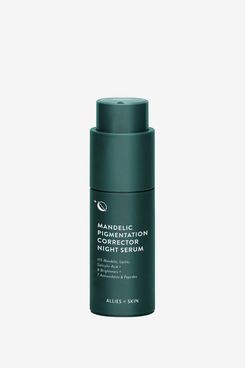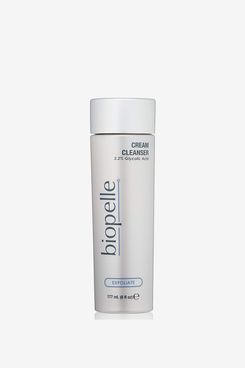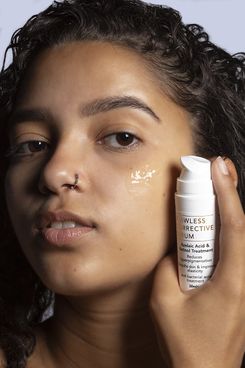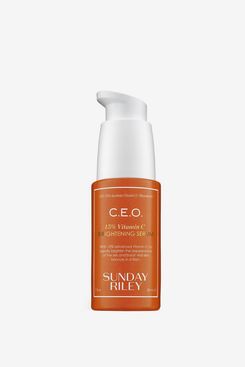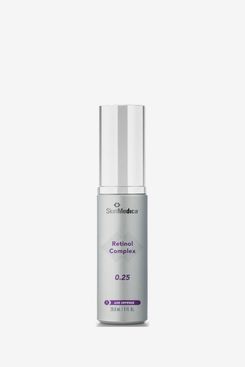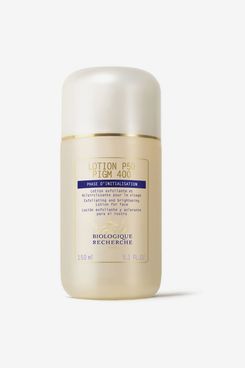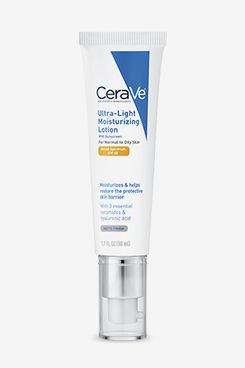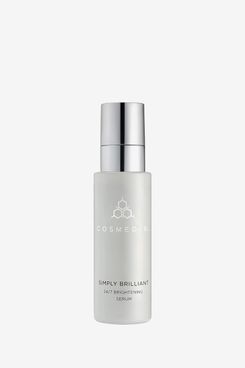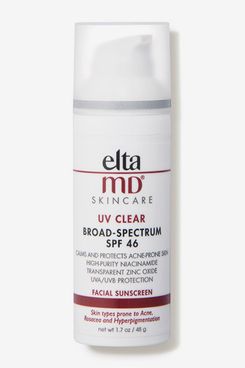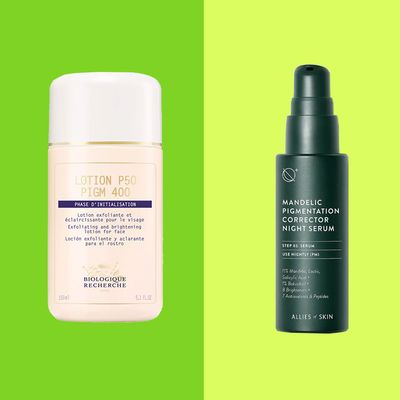
Hyperpigmentation is a common skin complaint, which can be caused by a multitude of factors, from pregnancy to acne to sun damage. There are three main types of hyperpigmentation — post-inflammatory, melasma, and freckles — and the type you have will depend on how it was caused. Post-inflammatory hyperpigmentation appears as acne scarring or as the result of a cut to the skin. Melasma is triggered by either hormonal changes (such as pregnancy or hormonal treatments) or UV damage. Freckles are sites of sun exposure and become more common as skin matures (other forms of age-related hyperpigmentation are known as maturational dyschromia).
“Hyperpigmentation is a catchall term to describe darkened patches or areas of skin caused by an increase in melanin,” says aesthetician Dija Ayodele, who founded the Black Skin Directory. “When there’s trauma to the skin like a cut or a spot, or we’re exposed to UV rays, the melanocyte cells in the skin — which control pigment — are triggered and produce an excess of melanin. This can result in discoloration and hyperpigmentation.” While anyone is susceptible to hyperpigmentation, the darker your skin is, the more prone you’ll be. “Darker skin tones are more prone to hyperpigmentation because of the increased levels of melanin,” explains Ayodele. “Dark skin usually has more active and larger melanocyte cells in the skin, which means that whenever there is any trauma, the melanocyte cells very quickly go into action and produce more melanin in an attempt to defend the skin.”
If you’re looking for products to treat hyperpigmentation, we’re here to help. We read studies in medical journals and consulted nine experts (from dermatologists to aestheticians) about how to minimise the appearance of hyperpigmentation marks. We also dove into product reviews, ingredient lists, and testimonials from Strategist contributors.
Before we continue, a couple of things to bear in mind: First, every expert whom we consulted stressed the importance of applying an SPF 30 (or higher) every single day. This is because UV light can both cause and intensify the appearance of hyperpigmentation.
Second, some of the ingredients used to treat hyperpigmentation can be harsh to sensitive skin. If you are using an exfoliating cleanser, dermatologist Adeline Kikam advises those with any skin type to only use it once or twice a week, and not to combine it with any other exfoliants that day. She also notes that if you’re new to incorporating acids into your skin regime, a slight stinging sensation during the first couple of uses is completely normal and should become tolerable over time.
Finally, there are no real quick fixes when it comes to treating long-term hyperpigmentation. Some products take up to two skin cycles (around 50 days) before yielding results, so if you’re not noticing any instant changes, patience is key. However, if a product is causing pain or irritation to the skin, do not persist with it. It probably means it simply isn’t right for your skin. If you do have particularly sensitive skin or a condition such as rosacea, we have some targeted suggestions, below.
Best hyperpigmentation treatment overall | Best exfoliating cleanser | Best serum for sensitive skin | Best serum for hormonal pigmentation | Best for age-related hyperpigmentation | Best treatment for acne scars
What we’re looking for:
Exfoliating: We looked out for ingredients such as AHAs, BHAs, lactic acid, salicylic acid, and glycolic acid, which each have exfoliating properties. As well as targeting hyperpigmentation marks, exfoliating can remove general dead or hardened skin cells and therefore improve the general texture and brightness of the skin — an added bonus.
Brightening: Water-soluble ingredients such mandelic acid are able to penetrate the outer skin barrier, evening the skin tone and strengthening it against future discolouration. Serums that contain vitamin C and glycolic acid are also known to brighten and give a glow to the skin. Meanwhile, some ingredients — like licorice extract and niacinamide — brighten the skin by inhibiting melanin production. As hyperpigmentation occurs due to the production of excess melanin, preventing this process will reduce the darkness and visibility of marks.
Best Overall Treatment for Hyperpigmentation
Exfoliating lactic and salicylic acids | Hydrating hyaluronic acid | Suitable for melasma and post-inflammatory hyperpigmentation
Two of our experts said this overnight corrector was their top pick for treating hyperpigmentation. It has a blend of 11 percent mandelic, lactic, and salicylic acids “so not only does it help tackle pigmentation through exfoliation, but it will also help with your skin texture and blemishes,” says beauty influencer Evie (known as @sknperfect). Benisha Williams, an aesthetician at Harley Street, agrees and advises that despite its powerful blend, it’s still suitable for sensitive skin as “it doesn’t cause as much irritation and dryness as many other acid-type products on the market.” This is thanks to ingredients such as hyaluronic acid and tamanu oil.
As well as brightening marks, Evie says the corrector makes her skin look “less congested,” and she finds herself getting “less blemishes” when she uses it. Williams notes this is most likely due to “the addition of lactic and salicylic acids, which encourages exfoliation and helps to lift superficial blemishes.” Reviewers say that as well as being hydrating, the corrector absorbs quickly and leaves no uncomfortable residue on the skin.
Best Cleanser for Hyperpigmentation
Exfoliating glycolic acid | Skin-energising taurine | Suitable for melasma and post-inflammatory hyperpigmentation
If your pigmentation is persistent, it might be worth tackling it in more than one step of your routine. “Biopelle’s cleanser is a firm favourite of mine. I use it twice a week,” says dermatologist Adeline Kikam, also known as @brownskinderm. “The main ingredient, glycolic acid, is a water-soluble AHA that sloughs away dead skin cells for more radiant, even-toned skin. It also unclogs pores, which is great for my acne-prone skin.”
If your skin is more sensitive, Kikam advises the CeraVe SA Cleanser as a great alternative. “It has gentler beta-hydroxy acids (BHAs) as well as other ingredients like ceramides to replenish the skin-care barrier,” she explains.
Best for Sensitive Skin
Cell-regenerating retinol | Azelaic acid for anti-redness | Suitable for melasma and post-inflammatory hyperpigmentation
Beauty influencer Kadeeja Khan says this Millionaire Beauty serum is great for “hyperpigmentation, discolouration, and redness.” The product contains a medicinal-grade concentration of azelaic acid, a powerhouse ingredient for clearing up post-inflammatory hyperpigmentation, melasma, and acne scars.
What’s more, Khan finds that the serum does so far more gently than any other that she has tried. “My skin is acne-prone and super-oily. I get lots of oily breakouts, and I react to lots of products, and then I have hormonal breakouts too,” she explains. “It has helped me a lot with my skin, and I use this twice a day — I might even do three times a day if I’m having more of a flare-up.” The serum is suitable for all skin types as well as acne scars. Reviewers on both the Millionaire beauty site and Trustpilot who have eczema, psoriasis, and rosacea find the product gentle enough to safely use on their skin.
Best for Hormonal Pigmentation (Melasma)
Exfoliating glycolic acid | Brightening 15 percent vitamin C | Hydrating glycerin for dry skin
Vitamin C serum is a great choice if your aim is to not merely brighten hyperpigmentation marks, but your overall complexion. For Dr. Mary Sommerlad, the Sunday Riley C.E.O. serum is her pick of vitamin-C serums, including for tackling marks caused by hormonal changes. “It really staved off the dull skin that sometimes occurs in pregnancy, and the texture is so luxurious,” she explains. “I found it really reduced the dark patches I got during my first pregnancy and gave me a more even skin tone.”
Makeup artist Adeola Gboyega is also a fan. “I have combination skin with an oily T-zone, but I don’t want to overly mattify my skin, so I love anything that gives my skin a glow,” she explains. “This serum is perfect. The texture is creamy yet lightweight and imparts a stunning radiance to my skin. I recommend this serum for all skin types and also for sensitive skin types that don’t get on well with other vitamin-C products, as this one has never irritated my skin.”
According to beauty journalist Rhea Cartwright, anywhere from a 10 to 20 percent concentration of vitamin C is an optimum amount within a serum — this one has 15 percent. The serum also includes a phytosterols complex, which reduces any spots of redness, and glycolic acid, which turns over dulling dead skin cells. As vitamin C is known to oxidise when exposed to air, Sunday Riley’s airtight bottle makes storing and using it fuss-free. If you’re not sure if vitamin C is right for your skin, fear not: The product is available in a miniature size.
Best for Age-Related Hyperpigmentation (or Maturational Dyschromia)
.25 Retinol concentration | Moisture-boosting ceramides | Hydrating vitamin E
Often signs of aging skin and hyperpigmentation marks can appear together as skin matures. To treat both, Kikam recommends a retinoid. “Retinoids promote cell turnover, keeping pores unclogged, and help to stimulate collagen production, which fights fine lines and wrinkles,” she explains. “Of particular significance to those with darker skin like myself is the ability of retinoids to treat both acne and post-inflammatory hyperpigmentation. By increasing skin-cell turnover, they facilitate melanin dispersion and improve hyperpigmentation.” Kikam’s pick is SkinMedica’s Age Defense Retinol Complex, which as well as brightening retinol contains ceramides and vitamin E to add hydration to the skin. Reviewers have noted that some peeling can occur when beginning to use this product (as with all products containing retinol, this is to be expected). The .25 concentration is ideal for beginner retinol users, and should be applied two or three times a week to avoid excess peeling and irritation.
Best for Acne (Post-Inflammatory Hyperpigmentation)
Liquid exfoliant | Brightening red algae | Suitable for darker skin tones
“For darker skin tones like my own, even the tiniest spot can leave irritating reminders of what was once there, long after acne has disappeared,” says contributor Christine Ochefu. After trying numerous methods, she eventually came across a product that cleared up her skin in the Biologique Recherche toner. It has been endorsed by such beauty sites as Into the Gloss and raved about by models including Paloma Elsesser, as well as the Strategist’s own Rio Viera-Newton. With the viscosity of water, the product (which Ochefu describes as more of a liquid exfoliant than a toner) easily permeates the skin, allowing its AHAs to slug away dead cells, as red algae and wasabi extracts brighten the skin. While eye-wateringly expensive, Ochefu finds that the product needs only to be used sparingly; a bottle will last her around six months. Reviewers find that, unlike some other exfoliating products, even sensitive and tender skin responds well to the lotion. If you’re unsure how (or how often) to use the product, Viera-Newton recommends consulting the P50 guide from Into the Gloss: “It explains which of the many different versions of P50 work best for certain skin types.”
Some other pigmentation products we’ve written about:
Our experts:
Dija Ayodele, aesthetician, founder of the Black Skin Directory.
Rhea Cartwright, beauty journalist.
Evie, beauty influencer known as @sknperfect.
Adeola Gboyega, makeup artist.
Kadeeja Khan, beauty influencer.
Dr. Adeline Kikam, dermatologist, also known as @brownskinderm.
Christine Ochefu, writer and Strategist contributor.
Dr. Aimee Vyas, founder of Doctor Aimee Facial Aesthetics & Skin.
Benisha Williams, aesthetician at Harley Street.
The Strategist UK is designed to surface the most useful, expert recommendations for things to buy across the vast e-commerce landscape. Read about who we are and what we do here. Our editors update links when possible, but note that deals can expire and all prices are subject to change.

